初中英语人教版七年级下册Unit4
人教版七年级英语下册Unit4 要点详解1

Don ’t eat in class.要点详解1. arrive, reach, get以上三词均可表示“到达、抵达”之意,但用法不同。
arrive 后接at (小地方)或in (大地方——城市、国家)reach 直接连“某地”,get 加to 后再接某地。
如:I arrived in Beijing yesterday.They reached the Great Wall by bus.How can I get to the TV station?若要表示“到家/这儿/那儿”时,用arrive / reach / get 均可。
即:arrive / reach / get home / here / there2. in class 和in the classin class 表示“在上课”,而in the class 表示“在班上”。
Don’t talk in class.上课时不要谈话。
There are 40 students in the class.这个班有40位学生。
类似的短语还有:at table at the table in hospital in the hospital out of question out of the question in front of in the front of 在进餐在桌上(生病等)住院在医院毫无疑问不可能的在……的前面在……的前部⎧⎨⎩⎪⎧⎨⎩⎪⎧⎨⎩⎪⎧⎨⎩⎪3. have to 和mustmust 表示“必须、应该”,是从主观出发的,同时must 意味着一种“责任”与“义务”。
如:We must help our parents do some housework.have to “必须”“不得不”,常表示受外界环境、条件所迫要做的事。
如:There is nothing in the fridge. I have to go shopping now.4. else 其他的else 表示“其他的,此外”,常被置于特殊疑问句、不定代词之后。
七年级下册英语人教版第四单元范文
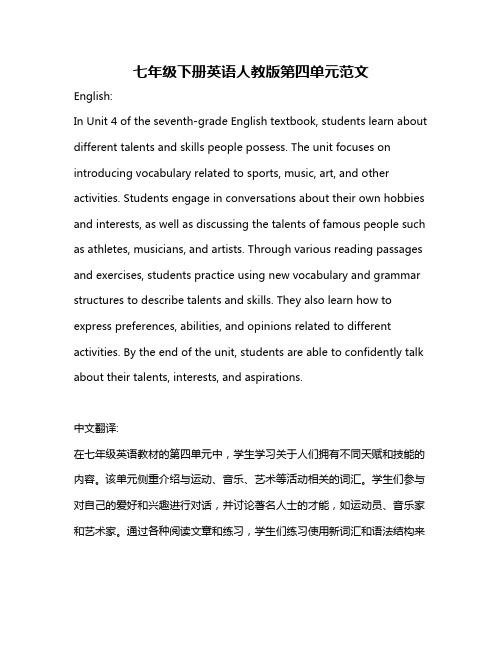
七年级下册英语人教版第四单元范文English:In Unit 4 of the seventh-grade English textbook, students learn about different talents and skills people possess. The unit focuses on introducing vocabulary related to sports, music, art, and other activities. Students engage in conversations about their own hobbies and interests, as well as discussing the talents of famous people such as athletes, musicians, and artists. Through various reading passages and exercises, students practice using new vocabulary and grammar structures to describe talents and skills. They also learn how to express preferences, abilities, and opinions related to different activities. By the end of the unit, students are able to confidently talk about their talents, interests, and aspirations.中文翻译:在七年级英语教材的第四单元中,学生学习关于人们拥有不同天赋和技能的内容。
该单元侧重介绍与运动、音乐、艺术等活动相关的词汇。
人教版英语七年级下册第四单元sectionb 2b 译文

人教版英语七年级下册第四单元sectionb 2b 译文English: In Section B of Unit 4 in the seventh grade English textbook published by People's Education Press, Exercise 2b provides a dialogue between two friends, Sarah and Amy, discussing their plans for the weekend. Sarah suggests going to the movies, but Amy prefers to go shopping instead. Sarah expresses her reluctance to go shopping, citing the crowded malls and high prices as deterrents. However, Amy persuades her by mentioning the upcoming sales and the fun they could have together. Eventually, Sarah agrees to accompany Amy shopping, showing their friendship and compromise in decision-making. This dialogue not only illustrates the common leisure activities of teenagers but also highlights the importance of communication and compromise in friendships.中文翻译:在人教版七年级英语教材第四单元B节中,2b练习提供了两位朋友Sarah 和Amy的对话,讨论了她们周末的计划。
七下英语书笔记第四单元人教版
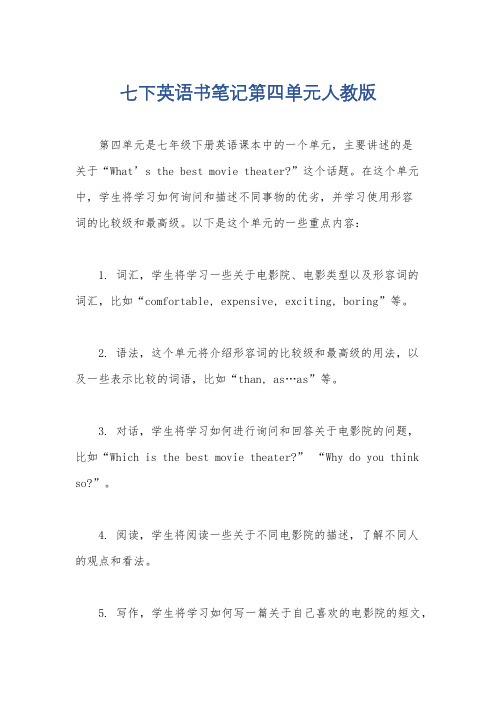
七下英语书笔记第四单元人教版
第四单元是七年级下册英语课本中的一个单元,主要讲述的是
关于“What’s the best movie theater?”这个话题。
在这个单元中,学生将学习如何询问和描述不同事物的优劣,并学习使用形容
词的比较级和最高级。
以下是这个单元的一些重点内容:
1. 词汇,学生将学习一些关于电影院、电影类型以及形容词的
词汇,比如“comfortable, expensive, exciting, boring”等。
2. 语法,这个单元将介绍形容词的比较级和最高级的用法,以
及一些表示比较的词语,比如“than, as…as”等。
3. 对话,学生将学习如何进行询问和回答关于电影院的问题,
比如“Which is the best movie theater?” “Why do you think so?”。
4. 阅读,学生将阅读一些关于不同电影院的描述,了解不同人
的观点和看法。
5. 写作,学生将学习如何写一篇关于自己喜欢的电影院的短文,
描述其特点和优势。
总的来说,这个单元旨在通过让学生学习如何描述和比较事物,提高他们的英语口语和书面表达能力。
同时,也能让学生了解到不
同人的观点和看法,培养他们的分析和表达能力。
希望这些信息能
帮助到你。
Unit 4 第4课时(Section B 1a-1d) (课件)七年级英语下册(人教版)
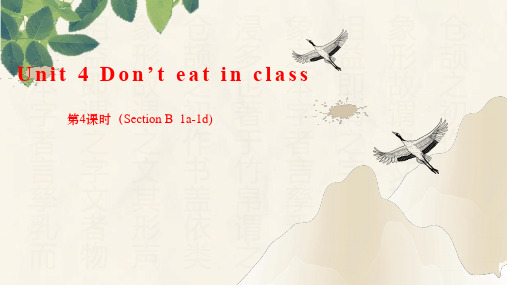
1d Talk about the rules in Dave’s house.
He can’t go out on school nights.
He can’t watch TV in the evening.
1d Talk about the rules in Dave’s house.
He can’t see his friends on school days.
does his homework
Look and say
What does he often do?
practices the guitar
Look and say
What does he often do?
does the dishes
Look and say
What does he often do?
பைடு நூலகம்
every Saturday on school days every morning
before dinner after dinner
1c
Listen again. Write when Dave has to follow the rules in the chart in 1b. Choose from the phrases in the box.
Emily : Hi, Dave. Do you _w_a_n_t_t_o_w__a_tc_h__th_e__b_a_sk_e_t_b_a_ll_g_a_m__e_in the park this evening? Dave: I’d love to, but I can’ t go out_o_n_s_c_h_o_o_l_n_i_g_h_ts__. Emily: Oh, that’s too bad. Dave: Yeah, I have s_o__m_a_n_y__ru_l_e_s... Emily: Really? Dave: Yeah, I can’t __se_e__m_y__fr_i_e_n_d_s_o_n_s_c_h_o_o_l_d_a_y_s_and I have to do my homework after school.
人教版七下英语第四单元笔记

人教版七下英语第四单元笔记English Answer:Unit 4: Holidays.Lesson 1: Chinese New Year.When is the Spring Festival held?The Spring Festival is held on the first day of the first lunar month.What are some of the traditional activities of the Spring Festival?Some of the traditional activities of the Spring Festival include:Eating dumplings.Watching lion dances.Setting off fireworks.Giving red envelopes.Visiting family and friends.What is the significance of the Spring Festival?The Spring Festival is a time for family reunions and a celebration of the new year.Lesson 2: Christmas Day.When is Christmas Day celebrated?Christmas Day is celebrated on December 25th.What are some of the traditional activities of Christmas Day?Some of the traditional activities of Christmas Day include:Exchanging gifts.Decorating Christmas trees.Singing Christmas carols.Attending church services.Eating Christmas dinner.What is the significance of Christmas Day?Christmas Day is a Christian holiday that celebrates the birth of Jesus Christ.Lesson 3: New Year's Day.When is New Year's Day celebrated?New Year's Day is celebrated on January 1st.What are some of the traditional activities of New Year's Day?Some of the traditional activities of New Year's Day include:Watching fireworks.Making New Year's resolutions.Eating special foods.Singing Auld Lang Syne.What is the significance of New Year's Day?New Year's Day is a time to reflect on the past year and to look forward to the future.Lesson 4: Chinese Dragon Boat Festival.When is the Dragon Boat Festival held?The Dragon Boat Festival is held on the 5th day of the 5th lunar month.What are some of the traditional activities of the Dragon Boat Festival?Some of the traditional activities of the Dragon Boat Festival include:Eating zongzi.Watching dragon boat races.Wearing sachets.What is the significance of the Dragon Boat Festival?The Dragon Boat Festival is a time to commemorate the Chinese poet Qu Yuan.Lesson 5: Double Ninth Festival.When is the Double Ninth Festival held?The Double Ninth Festival is held on the 9th day of the 9th lunar month.What are some of the traditional activities of the Double Ninth Festival?Some of the traditional activities of the Double Ninth Festival include:Climbing mountains.Eating chrysanthemum cakes.Drinking chrysanthemum wine.What is the significance of the Double Ninth Festival?The Double Ninth Festival is a time to celebrate the elderly and to enjoy the autumn scenery.中文回答:第四单元,节日。
初中英语七年级下册Unit4don'teatinclass.sectionA(1a-2d)说课稿
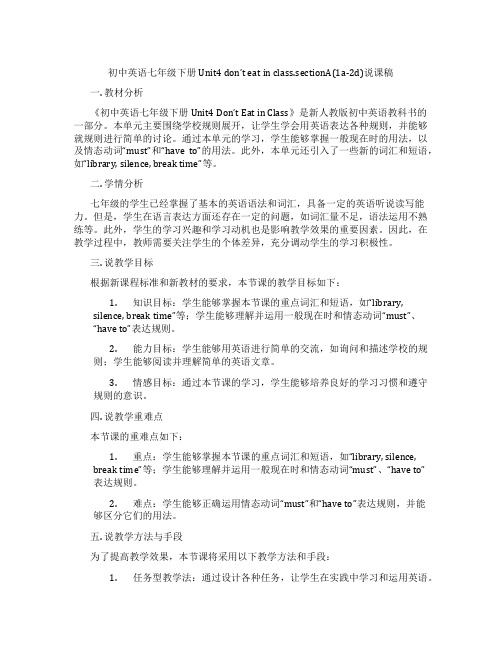
初中英语七年级下册Unit4 don’t eat in class.sectionA(1a-2d)说课稿一. 教材分析《初中英语七年级下册Unit4 Don’t Eat in Class》是新人教版初中英语教科书的一部分。
本单元主要围绕学校规则展开,让学生学会用英语表达各种规则,并能够就规则进行简单的讨论。
通过本单元的学习,学生能够掌握一般现在时的用法,以及情态动词“must”和“have to”的用法。
此外,本单元还引入了一些新的词汇和短语,如“library, silence, break time”等。
二. 学情分析七年级的学生已经掌握了基本的英语语法和词汇,具备一定的英语听说读写能力。
但是,学生在语言表达方面还存在一定的问题,如词汇量不足,语法运用不熟练等。
此外,学生的学习兴趣和学习动机也是影响教学效果的重要因素。
因此,在教学过程中,教师需要关注学生的个体差异,充分调动学生的学习积极性。
三. 说教学目标根据新课程标准和新教材的要求,本节课的教学目标如下:1.知识目标:学生能够掌握本节课的重点词汇和短语,如“library,silenc e, break time”等;学生能够理解并运用一般现在时和情态动词“must”、“have to”表达规则。
2.能力目标:学生能够用英语进行简单的交流,如询问和描述学校的规则;学生能够阅读并理解简单的英语文章。
3.情感目标:通过本节课的学习,学生能够培养良好的学习习惯和遵守规则的意识。
四. 说教学重难点本节课的重难点如下:1.重点:学生能够掌握本节课的重点词汇和短语,如“library, silence,break time”等;学生能够理解并运用一般现在时和情态动词“must”、“have to”表达规则。
2.难点:学生能够正确运用情态动词“must”和“have to”表达规则,并能够区分它们的用法。
五. 说教学方法与手段为了提高教学效果,本节课将采用以下教学方法和手段:1.任务型教学法:通过设计各种任务,让学生在实践中学习和运用英语。
人教版七年级英语下册Unit4复习课件

—Do my homework, of course.
A. What
B. When
C. Where D. How
4. —
late for school again.
—Sorry, I won’t.
A. Not be B. Don’t be C. Not D. Don’t
5. Which of the following pictures means“Please be quiet”?
【用法辨析】listen与hear的区别
【活学活用】
Байду номын сангаас
①听! 你能听见汤姆正在唱歌吗?
! Can you
Tom singing now?
②不要在会上听收音机。
Don’t
the radio in the meeting.
答案: ①Listen; hear ②listen to
4. We can’t wear a hat in our school. 在我们学校里不允许戴帽子。 【自主领悟】wear“穿; 戴”, 表示状态。相当于be in。例如: He is wearing a black T-shirt. 他穿着一件黑色的T恤衫。
【归纳拓展】before的其他用法
【活学活用】
①She always says goodbye to her mother before
(go)to school.
②He always washes his feet
he goes to bed.
A. after
B. because
C. if
D. before
his workers and he is
also strict
人教版七下英语Unit4第1课时(SectionA 1a-2d)
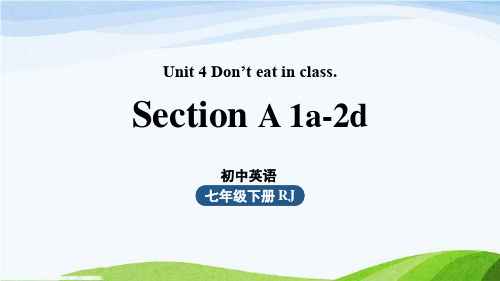
Activity
1. √___listen to music in the can can’t
classroom or hallways
2. √___listen to music in the can can’t
music room
3. √___listen to music outside can can’t
5. ___eat in the dining hall can
6. ___eat outside
can
7. ___wear a hat
can
8. ___fight
can
can’t
can’t
can’t can’t can’t can’t can’t can’t
Listen. Check (√) the activities Alan and Cindy talk about.
Don’t fight.
/faɪt/ n.& v. 打架;
战斗
Read the words and phrases before they are disappearing. bdlehiiasdmnafrhotoiulrneagunlinlniwlvhsen’lttetiagomy e
学生分两组,每一只蚂蚁代表 一组同学。一组的学生派代表 做违反校规的动作,另一组的 学生用英语表达他违反了什么 规则,说对了,点击小蚂蚁向 上爬一梯。两组学生轮流做动 作,看哪一组先爬上梯子。
2. Expressions: (be) on time, dining hall, listen to, have to 3. Sentences: ① Don’t fight./Don’t arrive late for class. ② We must be on time. ③ And we always have to wear the school uniform.
初中英语人教版七年级下册Unit4 Dont eat in class
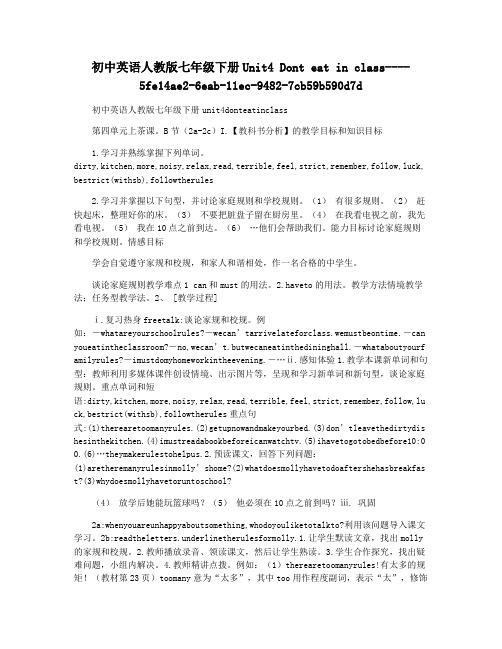
初中英语人教版七年级下册Unit4 Dont eat in class----5fe14ae2-6eab-11ec-9482-7cb59b590d7d初中英语人教版七年级下册unit4donteatinclass第四单元上茶课。
B节(2a-2c)I.【教科书分析】的教学目标和知识目标1.学习并熟练掌握下列单词。
dirty,kitchen,more,noisy,relax,read,terrible,feel,strict,remember,follow,luck, bestrict(withsb),followtherules2.学习并掌握以下句型,并讨论家庭规则和学校规则。
(1)有很多规则。
(2)赶快起床,整理好你的床。
(3)不要把脏盘子留在厨房里。
(4)在我看电视之前,我先看电视。
(5)我在10点之前到达。
(6)…他们会帮助我们。
能力目标讨论家庭规则和学校规则。
情感目标学会自觉遵守家规和校规,和家人和谐相处,作一名合格的中学生。
谈论家庭规则教学难点1 can和must的用法。
2.haveto的用法。
教学方法情境教学法;任务型教学法。
2、 [教学过程]ⅰ.复习热身freetalk:谈论家规和校规。
例如:―whatareyourschoolrules?―wecan’tarrivelateforclass.wemustbeontime.―can youeatintheclassroom?―no,wecan’t.butwecaneatinthedininghall.―whataboutyourf amilyrules?―imustdomyhomeworkintheevening.―…ⅱ.感知体验1.教学本课新单词和句型:教师利用多媒体课件创设情境、出示图片等,呈现和学习新单词和新句型,谈论家庭规则。
重点单词和短语:dirty,kitchen,more,noisy,relax,read,terrible,feel,strict,remember,follow,lu ck,bestrict(withsb),followtherules重点句式:(1)therearetoomanyrules.(2)getupnowandmakeyourbed.(3)don’tleavethedirtydis hesinthekitchen.(4)imustreadabookbeforeicanwatchtv.(5)ihavetogotobedbefore10:00.(6)…theymakerulestohelpus.2.预读课文,回答下列问题:(1)aretheremanyrulesinmolly’shome?(2)whatdoesmollyhavetodoafter shehasbreakfas t?(3)whydoesmollyhavetoruntoschool?(4)放学后她能玩篮球吗?(5)他必须在10点之前到吗?ⅲ. 巩固2a:whenyouareunhappyaboutsomething,whodoyouliketotalkto?利用该问题导入课文学习。
人教版七年级英语下册Unit 4第4课时Section B(2a-Self Check)教案

第4课时Section B(2a-Self Check) 【学习目标】【课堂导学】Step 1 情景导入Teacher:When you are unhappy about something,who do you like to talk to,your parents,your teachers or your friends?Can you tell me?Students:…Teacher:Molly is a student like us. She is very upset. Do you know why she is unhappy,and who she likes to talk to?环节说明:通过情景导入既完成了2a的学习又引出了Molly的烦恼,引起学生的好奇心,激发了他们的学习欲望。
Step 2 完成教材2a~2c的任务1.小组内讨论2a的问题。
2.快速阅读2b信件了解信件内容,圈出Molly 的家规。
(2分钟)3.再次认真阅读信件,回答下列问题。
(3分钟)(1)Are there many rules at Molly's home?(2)How does Molly go to school?(3)Does Molly never play basketball?4.第三遍阅读短文完成2c的选词填空。
(3分钟)5.小结训练。
(4分钟)单项选择。
(1)Please don't make so much__A__.It's too______.A.noise;noisy B.noisy;noisy C.noise;noise D.noisy;noise(2)Mr. Zhang is our English teacher,and he is very strict__C____us and__________his work.A.in;in B.with;with C.with;in D.in;with(3)__B__he________I can go there by bike because there is only one bike.A.Between;and B.Either;or C.Neither;or D.Either;and环节说明:这一环节的学习不仅巩固了本单元的语法,而且还锻炼了学生阅读能力和概括能力。
人教版七年级英语下册教学课件《Unit 4 Section A 1a-1c》
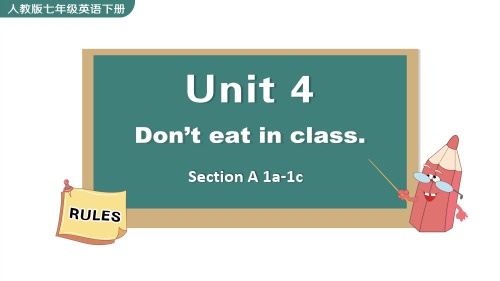
违反规章
school rules 校纪 = the rules of the school class rules 班规 = the rules of the class ※ rule还可以用作动词,意为“统治,支配”。 e.g. The king ruled the country 500 years ago.
2. It’s very hot outside. You __c_a_n__ wear a hat. 3. We _c_a_n_’_t_ eat in the classroom, because it’s
impolite to teachers. 4. I _c_a_n_’_t_ go to bed after 11:00 on school night. 5. The students __c_a_n__ read books and magazines
I never heard such an interesting story. 我从来没听过这么有趣的一个故事。
2) listen“听” 侧重于“听”这一动作。例如: Listen to me carefully. 认真听我说。
Children like to listen to music. 孩子们喜欢听音乐。 3) sound“听起来”,它是系动词,后面接形容词等。 例如: That sounds great. 那听起来真不错。 It sounds like fun. 听起来挺有趣。
2. When do you usually arrive _a_t__ the bus station?
3. Jenny’s uncle usually arrives _in__ Shanghai in the evening.
初中英语 七年级下册 Unit4 Don't eat in class

(2)意为“一定;准是”,表示肯定推 测,用于肯定句中。 这本书一定是玛丽的。
The book must be Mary’s.
2.情态动词 have to 的用法 (1) have to 意为“必须;不得不”,后接动词 原形,表示客观需要做的事情。 现在我不得不离开。 I have to leave now.
不要吵闹。 Don’t be noisy.
肯定句:
让我帮你吧。
Let+宾语+动词原形+其他. Let me help you.
Let 型 否定句:
①Don’t let+宾语+动词原 形+其他. ②Let+宾语+not+动词原 形+其他.
别让他走。
Don’t let him go./
Let him not go.
2.祈使句的句式
肯定句:
请坐。
动词原形(+宾语)+其他. Sit down, please.
Do
型 否定句:
不要在这儿跑。
Don’t +动词原形(+宾语)
+其他.
Don’t run here.
肯定句: Be +表语+其他. Be 型 否定句: Don’t + be +表语+其他.
请安静。 Be quiet, please.
Summary
语法 1. 祈使句的三种类型用法
Don’t run in the hallway. 2. 情态动词can, must, have to的用法
Can we wear a hat in class? We must be on time for class. We have to be quiet in the library.
Unit4GrammarFocus3c课件人教版英语七年级下册

We can eat in the classroom …
We don't have to wear school uniforms…
We can listen to music in the classroom …
询问规则
Can we eat in the
No, we can’t, but we can
classroom?
eat in the dining hall.
情态动词can的一
般疑问句及其答句
Can we wear a hat in class? Yes, we can. / No, we can’t.
重点① Don’t…祈使句的运用。 重点② 情态动词can,have to,must的使用。
一、语法点单句特训。 ( A )1.—Mike, remember to OK, Mr.Chen.
your homework to school. —
A.bring
B.take
C.carry
D.do
( C )2.Don’t
must 其他用法 must: 表示猜测,“一定;必然”
You must be hungry.
3a
1 2
Write the rules for the school library.
Tip: Try to use No+N/Doing.
Library Rules
Don’t talk.
1._N__o_t_a_l_k_in_g_/_B_e__q_u_ie_t_._______
人教版七年级英语下册Unit 4 Section A 第一课时课件

Name
Peter
Amy
Mike
Rule
2
3
4
1b
1. Don't arrive late for class. You must be on time. 2. Don't run in the hallways. 3. Don't eat in the classroom. You must eat in the dining hall. 4. Don't listen to music in class. 5. Don't fight.
Role-play the conversation.
John: Hi, my name’s John. It’s my first day at school. Alice: Hi, John. I’m Alice. This is a great school, but there are a lot of rules. John: Really? What are some of the rules? Alice: Well, don’t be late for class. This is very important.
1c
Student A is a new student. Student B tells Student A about the rules above.
A: What are the rules? B: Well, we can’t arrive late for class. We must be on time.
七年级Unit 4(单元解读课件)-七年级英语下册同步备课系列(人教版)

学习理解 应用实践
学习理解 应用实践
迁移创新
课时内容解读
第四章
PART FOUR
单元内容解读
主题词汇
rule, dish, night, luck, hair, arrive, listen,fight, wear, bring, practice, relax, read,feel, remember, follow, keep, learn, quiet,noisy, dirty, terrible, strict
2d所提供的对话呈现老生与新生谈论关于学校的校 该 语 篇 的 语 词汇:
在看图和
规的对话,包括了上课不迟到,不带吉他去学校,穿 法 功 能 性 比 wear,immportant , 听对话的
校服以及在图书馆保持安静。
较 强 , 能 为 bring ,uniform , 过程中,
grammar focus表格呈现了单元重点语法功能结构, 学 生 学 习 语 quiet
学习理解 应用实践
1. 学生能够用do型祈使句表达规则 2.学生能掌握用can的肯定句,否定句和一般疑问 句表达规则。 3. 学生能学会遵守学校规则
学习理解 应用实践
统筹课时安排
教材板块
课型
第*课时
课时目标
学习层次
第三节 SectionB
1a-1f
第四节 SectionB
2a-2c
第五节 SectionB 3a-self
能简单谈论规章制度
主题群:做人与做事,人际沟通
子主题内容:班级与学校规则,规
则意识
单元内容解读
01 What:该单元语篇内容主要是中学生的学习和生活上的规章制度
Why:引导学生关注规则,养成遵守规则的习惯和意识。训练学生遇到规则问题
Unit4SectionB3a3c课件人教版英语七年级下册

5. eat/ dining hall W__e__m__u_st_/_c_a_n_e_a_t_i_n_t_h_e__d_in_i_n_g_h__a_ll_.
what did Nancy want to do? 6.Did Nancy understand her mother at last? 7. What did Nancy do a week later?
Reading
3a Read the story and answer the questions. •1. Why was Nancy’s mom angry with her?
1 Fill in the blanks with the words in the box.
•arrive late, listen to, be noisy,
•follow the rules, be strict
My name is Timmy the Mouse. I must get up early at 6:30 a.m. every morning. Then I have to go to the kitchen to get food for Grandpa. I never _a_r_r_i_v_e_l_a_teto the kitchen because I have to get there before the cat gets up. My grandpa always tells me I can’t _b_e_n_o_i_s_y. I _li_s_te_n__t_o him because I don’t want the cat to get me! My grandpa _is_n_'_t_s_tr_i_ctwith me, but I think it’s best to _f_o_l_lo_w__t_h_e_r_u_l_e_s.
人教版初中英语7年级下册unit4知识清单+习题 (附解答)
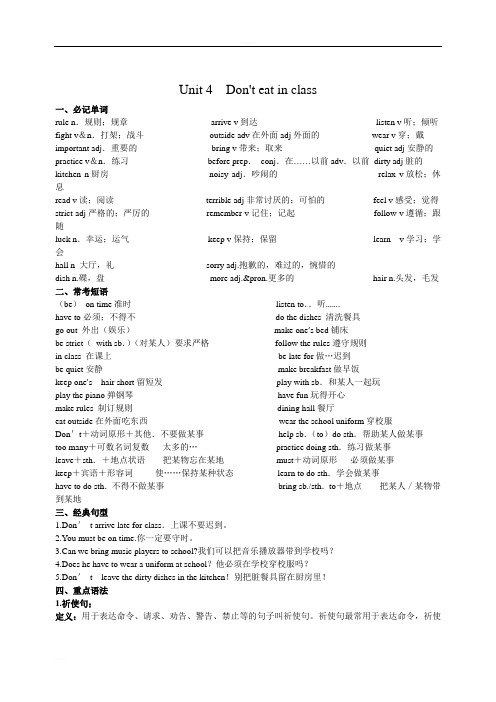
Unit 4 Don't eat in class一、必记单词rule n.规则;规章arrive v到达listen v听;倾听fight v&n.打架;战斗outside adv在外面adj外面的wear v穿;戴important adj.重要的bring v带来;取来quiet adj安静的practice v&n.练习before prep.conj.在……以前adv.以前dirty adj脏的kitchen n厨房noisy adj.吵闹的relax v放松;休息read v读;阅读terrible adj非常讨厌的;可怕的feel v感受;觉得strict adj严格的;严厉的remember v记住;记起follow v遵循;跟随luck n.幸运;运气keep v保持;保留learn v学习;学会hall n 大厅,礼sorry adj.抱歉的,难过的,惋惜的dish n.碟,盘more adj.&pron.更多的hair n.头发,毛发二、常考短语(be)on time准时listen to..听…….have to必须;不得不do the dishes 清洗餐具go out 外出(娱乐)make one’s bed铺床be strict(with sb.)(对某人)要求严格follow the rules遵守规则in class 在课上be late for做…迟到be quiet安静make breakfast做早饭keep one’s hair short留短发play with sb.和某人一起玩play the piano弹钢琴have fun玩得开心make rules 制订规则dining hall餐厅eat outside在外面吃东西wear the school uniform穿校服Don't+动词原形+其他.不要做某事help sb.(to)do sth.帮助某人做某事too many+可数名词复数太多的…practice doing sth.练习做某事leave+sth.+地点状语把某物忘在某地must+动词原形必须做某事keep+宾语+形容词使……保持某种状态learn to do sth.学会做某事have to do sth.不得不做某事bring sb./sth.to+地点把某人/某物带到某地三、经典句型1.Don't arrive late for class.上课不要迟到。
- 1、下载文档前请自行甄别文档内容的完整性,平台不提供额外的编辑、内容补充、找答案等附加服务。
- 2、"仅部分预览"的文档,不可在线预览部分如存在完整性等问题,可反馈申请退款(可完整预览的文档不适用该条件!)。
- 3、如文档侵犯您的权益,请联系客服反馈,我们会尽快为您处理(人工客服工作时间:9:00-18:30)。
Unit 4Don“t eat in class.
Section A (1a-2c)
一、教学目标:
1)能掌握以下单词:rules,arrive,late,hall,dinninghall,listen,listen to, fight, sorry
2)能掌握以下句型:
①Don“t eat in class.
②You must be on time.
③Eat in the dining hall.
3.学会用英语表达一些标志的含义。
4.烂熟使用目标语言谈论对某些规章制度(校规、家规等)的看法
二、教学重难点
1.教学重点:
1)肯定祈使句是省略掉主语的原形动词开头;
2)否定祈使句则是在肯定祈使句前加上“don’t”。
3)情态动词must及have to在用法上的区别。
2.教学难点:
掌握祈使句的用法,并能听懂、会说一些简单的祈使句。
三、教学过程
Ⅰ. Warming-up and revision
教师进教室后,使用祈使句请学生们完成一系列动作:
Pleasestandup/sitdown.Closethedoor,please.Lookatmeand listen to me.
Don’t open your books.Don’t talk.Let’s begin our class.学生听教师的指令完成各种动作,教师也可将指令写到黑板上,让学生从视觉上考察祈使句的特点。
Ⅱ. Presentation
1.教师出示书上1a的图片,向学生提问。
Can we _____?学生轮流回答
2.看图。
指着图上奔跑的男孩提问
T:What’s the boy doing?S: He’s running.
T:Where is he running?S: He’s running in the hallways.T:Can you run in the hallways?S: No, I can’t.
T:So please don’t run in the hallways.
(= You can’t run in the hallways.)
学生跟读数遍,明白祈使句和“can”的表达含意。
T:Why is he running in the hallways?S: He’s late.T: Oh, he’s late for class.
You can’t arrive late for class. = Don’t arrive late for class.3show some picture ,then practice don’tcan’t
Ⅲ. 1a
T: Now, Look at the picture on your textbook. Each of the students isbreaking one of these rules.
Please finish 1a.
学生看图,完成1a的内容,检查答案并大声朗读校规。
Ⅳ. Listening
1. T: Now let’s listen! What rules are these students breaking? Writethe numbers after names?
2.学生们听录音,完成1b,选出三位学生都违反了哪条校规;听之前,学生要读会英文名。
3. Check the answers:
Ⅴ. Pair work
请两位学生朗读1c部分的句型;要求学生两人一组对话表演,(学生可经过讨论,多说出他们想到的校规,不必只限于书上;教师应给予帮助)
Ⅵ. Listening
1. Work on 2a:
First, let“s read the sentences in 2a together.
T:Now,let“slistentotherecording. ChecktheactivitiesAlanandCindy talk about.
Ss listen to the recording and check the activities they hear.
Play the recording again for the Ss to check the answers.
2. Work on 2b:
Make Sure Ss know what they should do.
Listentotherecordingagain.CanAlanandCindydotheseactivities? Circle can or can“t above.
3. Check the answers:
Ⅶ. Pair work 2c
1. Suppose you are Alan and your partner is Cindy. Talk about therules in 2a.
2. Let some students come to the front and act out the
conversations.Homework
1.Read the sentences in Grammar Focus.
2.Make some rules at home.
板
Section A (1a-2c)
1. Don“t ar rive late for school. You must be on time.
2.—What are the rules?
—Well, we can“t arrive late for class. We must be on time.
3. Listen to music in the music room.书设计。
